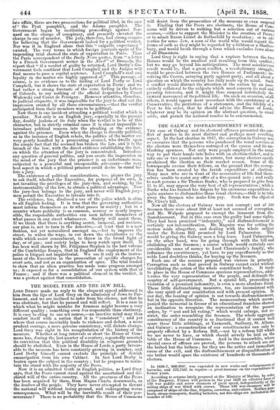THE MODEL PEER AND THE JEW BILL.
Lona) DERBY made no reply to the eloquent appeal addressed to him from the lips of Lord Grey on the admission of Jews to Par- liament, and we are inclined to infer from his silence, not that he was obstinate, but that he paused and will reflect. It is a case in which what he might mistake for firmness might become a very different quality ; something even less respectable than obstinacy. It is easy to cling to one set course,---an inactive mind may thus comfort itself with a notion that it is " consistent " ; and yet where that course inevitably leads to violence and defeat, a more prudent courage, a more genuine consistency, will dictate change. Lord Grey was right in his recapitulation of the history of the measure. Whether at long intervals or short the House of Com- mons has, during the last quarter of a century, repeatedly asserted its conviction that this political disability on religious grounds should be abolished. Even in the House of Lords a party favour- able to the measure has been constantly growing in number, and Lord Derby himself cannot exclude the principle of Jewish emancipation from his own Cabinet. In fact Lord Derby is beaten upon the subject in the country ; but he proposes to main- tain the stand with the majority of the Peers. Now it is an admitted truth in English politics, as Lord Grey says, that the Peers cannot stand against the ascertained and de- clared will of the entire country. All the greatness of the Peers has been acquired by them, from Magna Charts downwards, as the leaders of the people. They have never attempted to thwart the national will without losing ground, and endangering worse consequences. What will be the inevitable result of their per- severance ? There is no probability that the House of Commons will desist from the prosecution of the measure or even suspend it. Finding that the Peers are obstinate, the House of Com- mons will be driven to nothing but a selection out of various courses,—either to support the Minister in the creation of Peers or to admit Baron Lionel de Rothschild by resolution ; or to ad- vertise for some Jew, a man of the world who would regard the forms of oath as they might be regarded by a Gibbon or a Shaftes_ bury, and would break through a form which excludes Jews alone of all Dissenters.
Lord Grey is.right in saying that a rupture between the two Houses would be the smallest evil resulting from this conflict; but we may go beyond his anticipations. The most mischievous result would be, that a great conflict, a revolutionary struggle, would be provoked between the two Houses of Parliament; in- volving the Crown, arraying party against party, and all about a question on which the country has fully made up its mind. Such a conflict would distract the attention of the nation by an issue entirely collateral to the subjects which most concern its real and pressing interests, and it might thus suspend indefinitely the onward movement of its political life. On such an occasion, dell others, it would appear most accordant with the consistency of a Conservative, the patriotism of a statesman, and the fidelity of a Peer to his order, that he should advise the House of Lords, whatever may be its opinion on the abstract question, to stand aside, and permit the national resolve to be consummated.


























 Previous page
Previous page